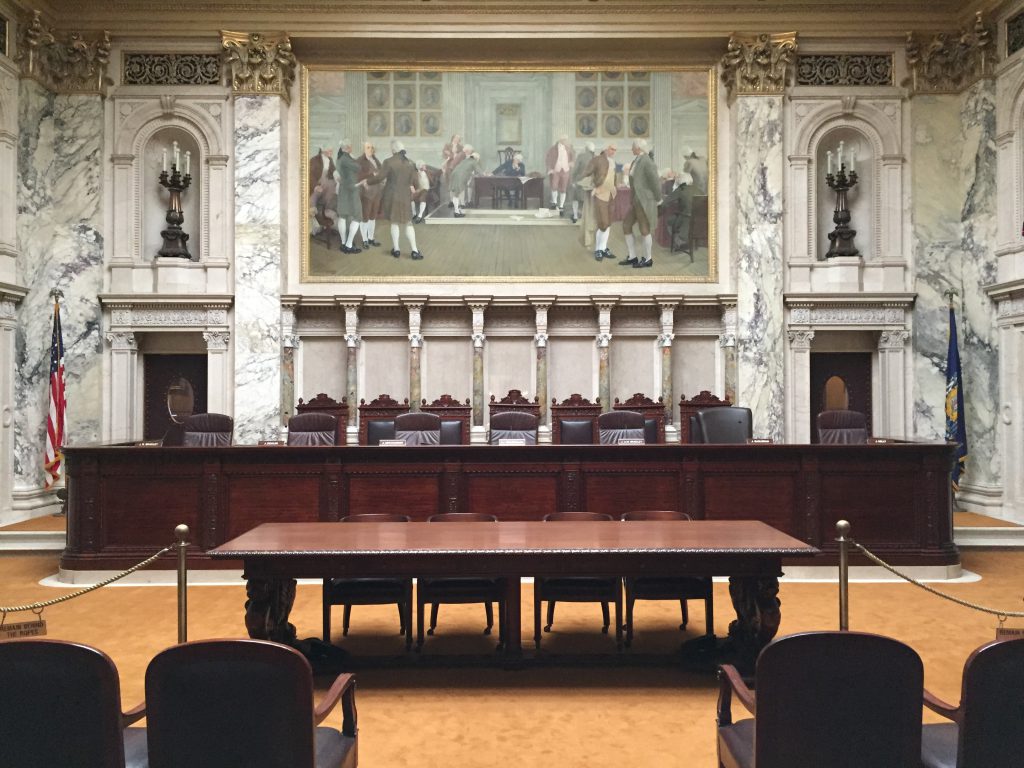Will State Judges Protect Voting Rights?
Expert at state forum suggests federal courts may be less important as state courts rule on election laws.
State judges could play important roles in protecting voters’ rights in lawsuits over changes in election laws enacted after disputed 2020 elections, according to a UW-Madison Law School professor.
Professor Robert Yablon, at an online conference on restoring confidence in the nation’s elections system sponsored by the UW-Madison Elections Research Center, said federal courts in the wake of the disputed presidential election met only a “minimum threshold” of judicial independence.
Yablon’s comments came the day before a Waukesha County business executive, Jeré Fabick, asked Wisconsin’s Supreme Court to intervene and ban ballot dropoff boxes and prohibit election clerks from adding information on absentee ballot envelopes before April 6 spring elections.
The state Supreme Court has also been asked to take direct jurisdiction over lawsuits expected to be filed that challenge new Congressional and legislative district lines that will be drawn by Republicans who control the Legislature. The court has not ruled on that request.
Should the court decline to do this, there will likely be a battle between Democratic Gov. Tony Evers, who would veto any redistricting bill he dislikes, unless Republicans try to pass it through a joint resolution, which does not require a governor’s approval. This approach was tried in the 1960s and struck down as unconstitutional by the state high court.
Republican legislators are also drafting several bills that would change how votes are cast and counted in Wisconsin in the wake of President Joe Biden’s narrow win over Donald Trump. Evers, however, clearly has the power to veto those bills.
Explaining why state courts could champion voting rights, Yablon said federal judges “didn’t overturn the [election] results,” but “had largely a ‘hands off’ approach – turning away lawsuits that sought to improve voting access” before the presidential election
“When we think about voting rights, we are often fixated on the federal courts. It is important to think about state courts.”
State judges often “have more to work with” because “state constitutions often say more about the federal constitution in terms of the right to vote,” Yablon said.
That said, “We’re not going to litigate our way out of distrust in elections,” he added
Still, Yablon said, state courts can be “an effective venue for preserving and testing evidence about claims: Is a law actually necessary to prevent fraud? Is it actually going to improve confidence in elections? Let’s hear some evidence and offer reasoned argument.”
Yablon also said another election change pending in the Legislature – rank-choice voting – “may do at least a little bit to take the edge off some of the extreme partisanship we see.”
A rank-choice voting bill has been introduced by two Republicans and two Democrats: Sens. Dale Kooyenga (R) and Jeff Smith (D), and Reps. Tony Kurtz (R) and Daniel Riemer (D).
According to the Associated Press, it would work this way: Instead of partisan primaries, where Republicans and Democrats separately vote for their candidates, all candidates appear on the same ballot. Voters select their favorite candidate, regardless of political party, and the top five finishers advance to the general election.
At that election, voters can rank their favorites in order of preference from first to fifth. If one candidate gets a majority of first-place votes, the election is over. If no one has a majority, there is an instant run-off where the lowest vote-getter is eliminated and anyone who had that person as their top choice instead has their second favorite candidate counted. The votes are counted again and that process continues until someone has more than 50% of the vote.
Another UW-Madison professor who participated in the forum, political scientist David Canon, said the “ridiculous” law that prohibits the processing of absentee ballots before election day should be repealed. Wisconsin is one of only four states with that restriction.
Of the record 3.3 million votes cast for President in Wisconsin last year, about 2 million were absentee ballots.
UW-Madison professor Barry Burden, who directs the Elections Research Center, said the forum was scheduled because, “I’m not sure there is a more pressing issue right now for democracy than insuring that the public believes in the system that gathers its votes and chooses its leaders.”
Steven Walters has covered the Capitol since 1988. Contact him at stevenscotwalters@gmail.com
If you think stories like this are important, become a member of Urban Milwaukee and help support real, independent journalism. Plus you get some cool added benefits.
The State of Politics
-
A Wisconsin Political Trivia Quiz
 Dec 15th, 2025 by Steven Walters
Dec 15th, 2025 by Steven Walters
-
The Fight Over Wisconsin’s House Districts
 Dec 8th, 2025 by Steven Walters
Dec 8th, 2025 by Steven Walters
-
The Battle Over On-Line Betting
 Nov 24th, 2025 by Steven Walters
Nov 24th, 2025 by Steven Walters





















